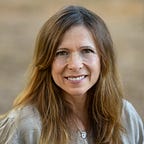Light is being shed on the dark underbelly of pervasive racism in our country and the immense pain and suffering it causes to millions of our fellow Americans. An “ism” is a belief system — racism, sexism, fascism, anti-Semitism, ableism, carnism. Before we can make systemic change to any “ism”, we need to wake up to our personal unconscious contributions.
This is a bit of a long story, but it will help empower those of us feeling unsure how we can help with the “ism” of race.
Earlier this year, I was going about my day, innocently listening to one of my favorite podcasts, Speaking Your Brand, and the topic was, Why We’re #ChoosingWomensVoices — and You Should Too. The host, Carol Cox, challenged her listeners to seek out women’s voices during a 5- day period. When she explained the impetus for the challenge, my heart started to race.
The story began several months earlier for both her and me.
At that time, top podcaster, Tim Ferriss, responded to criticism about his show’s lack of guest diversity. He asserted that he did not need to have more diverse guests because that’s not his job. He believes his job is to interview the very best subject-matter expert, period.
This incensed Cox and planted the seed for her challenge. Why did her revelation stop me in my tracks? Because I, too, had heard Ferriss’ response, but…I agreed with him! It made sense to me at the time. I thought, yeah, get the very best, that’s why you have such a successful pod. Oh my. I was so unconscious on this topic!
Cox, however, pushed back against the inherent sexism/male hegemony in Ferriss’ response. She took a broader perspective and explained how there is usually more than just one person who is the top expert in their field. It is up to all of us to help promote diverse experts. I hadn’t thought of this prior having bought into societal — aka white male — programming.
I immediately signed up for the challenge! Each day, Cox prompted us with a question to ponder and positive actions to take. For example, one day she asked us to inventory our consumption of media. “How many podcasts do you listen to that are led by white males and the guests are predominately white males?”
Me: many, if not most. Ugh.
Awakening to this realization was a great first step. She then challenged us to delete some of them and replace them with podcasts hosted by women, people of color, and the LBGTQ communities. To make it easier, she gave us loads of recommendations. Some of my favorite new podcasts come from this list. The positive impact of this exercise also inspired me to want to explore more areas of my life where my blind assumptions have hampered my perspectives.
She challenged us to use this filter on other media we consume — books, movies, shows. Little did I know, this was just the beginning!
During her follow-up episode, A Feminist Approach to Public Speaking, Cox pushed us to take further action. She told us about the clause in her contract that if she is invited to participate on a panel, she requires the panel be at least 50% minority panelists. If she needs to decline due to lack of diversity, Carol asks the event organizer to give her panelist slot to a minority.
This does two things. First, she is acting in accordance with her values — even at the expense of losing paid speaking opportunities. Second, it plants the seed in the event organizer’s mind that this is something they could consider as they plan future events.
I was walking my dog as I heard her suggest this and I remember thinking, “Wow, I wonder if I would have the courage to do that?” I’m building my speaking opportunities, after all, not trying to reduce them.
Carol then explained her abundance mindset, “there are more than enough speaking gigs for everyone.” If she can help someone from the minority community get an extra speaking role, she will!
I share this as a reminder that, before we can make systemic change, we must wake to our own unconscious contributions to the problem. Then we take thoughtful action:
Read books by minority authors
Listen to podcasts with diverse hosts and guests
If you organize events, seek out diverse speakers and panelists
If you are asked to participate in an event, require diversity for other participants before accepting
Shop at small, local, and minority-owned businesses rather than big corporate conglomerates
Mentor/hire from minority groups
Open your friend group to people who are dissimilar to you
These are a few ideas and just the beginning. For even more concrete ideas, listen to Cox’s excellent episode, The Work of Anti-Racism as White Women. If you are white, regardless of gender, this is a must-listen!
In summary, it’s great to post, repost, and protest. If we hope to make meaningful change, however, we must become aware of our own unconscious contributions to the problem. Once we bring these hidden beliefs to light, we can question their truth. Then, we can change ourselves and the collective through thought-full and proactive action.
Clairvoyant Reader | Coach | Public Speaker. Empowering people to master their energy and elevate their lives! Contact me at www.ascendedpresence.com
